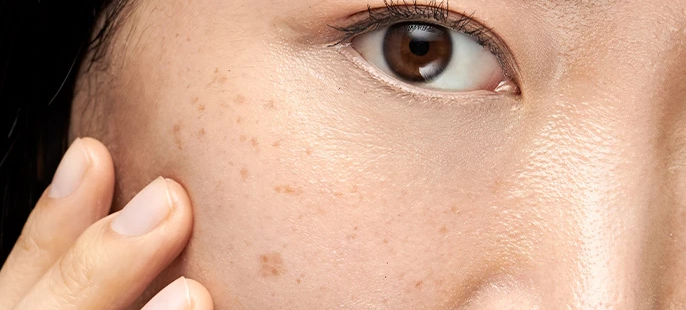-
A derm-approved way to get rid of dark spots
In an ideal world, there would always be warning signs before the skin takes action. And sometimes it does. Acne tends to be red and itchy, and wrinkles begin in fine lines years before they occur. Hyperpigmentation, on the other hand, can be fleeting, and once you get there, it's even harder to know what to do about it.
So what exactly is hyperpigmentation? In a nutshell, it refers to excess melanin pigment that appears as dark spots. This could be the result of sun damage, acne scars, or some of the good old aging process.
Today, there are more options to erase that pesky discoloration than ever before (see azelaic acid, mandelic acid, niacinamide, hydroquinone, etc.). However, lightening the skin does not always have a single answer. Because hyperpigmentation in darker skin poses specific challenges when it comes to treatment, we asked Seemal Desai, MD, FAAD, a board-certified dermatologist and former president of the Skin of Color Society in Plano, Texas, to fill us in on how to get Get rid of those pesky dark spots. Keep reading for everything you need to know about dealing with pigmentation issues on different skin tones.
For light/medium skin tones
According to Dr. Desai, people with lighter skin tones have more options for getting rid of dark spots than those with darker skin tones. "There are cosmetic procedures to help with pigmentation that are less complicated to use than for ethnic skin, such as micro needling and chemical peels," Dr. Desai says. However, the procedure should always be done by a board-certified dermatologist. Laser treatments and bleaching agents are also options.
If you want to lighten blemishes at home, you should use plant-based antioxidants with anti-inflammatory properties such as green tea extract, resveratrol, ferulic acid, and vitamin C. These have powerful whitening properties and can help prevent future UVA damage. Try: Denise Gross Skin Care Ferulic Acid + Retinol Brightening Solution.
More aggressive ingredients like retinol can also help treat patients with hyperpigmentation, but patients with sensitive skin may not tolerate prescription-strength retinoids (such as retin-A and isotretinoin), Dr. Desai says. In this case, a product formulated for sensitive skin with a lower concentration of retinol is a great option. Sente Biocomplete Serum, or bakuchiol , a natural alternative to retinol Olehenriksen Glow Cycle Retin-ALT Power Serum.
If your skin is darker
The darker the skin, the more melanin it contains, which naturally protects it from sun damage, but without a little help, the skin cannot be fully protected.
Dr. Desai recommends dark spot correctors that contain non-hydroquinone ingredients such as cysteamine, vitamin C, and azelaic acid. Ask your dermatologist about brands such as Cyspera which contains a topical cream containing cysteamine hydrochloride (HCI), a naturally occurring biological compound. This helps to reduce the appearance of stubborn skin discoloration with darker skin tones. He also recommends combining prescription and medicated cosmetic ingredients with sunscreen.
Professional treatments such as bleaching and lasers can actually exacerbate dark skin discoloration and lighten the surrounding area, Dr. Desai says. Instead, ask your dermatologist about a series of in-office peels to resurface the skin. Vitamin injections, which deliver an active solution directly into the bloodstream and work to address hyperpigmentation in reverse, are another potential solution.
Most importantly, Dr. Desai recommends seeking out a board-certified dermatologist who specializes in skin of color. People with darker skin may want to consider only procedural treatments to get rid of dark spots after all topical options have been exhausted.
For All People
It is important to understand that hyperpigmentation is a very complex condition and not all skin tones and types respond to the same form of dark spot treatment. Different skin types will have different symptoms of the condition, Dr. Desai says. The key to treating dark spots is to use a combination of prescription and medicated cosmetics and incorporate SPF. It's important that all patients, regardless of treatment or skin color, use a lifelong sunscreen," he says. "In general, the longer pigmentation is present on the skin, the more difficult it is to treat." The sooner you see a dermatologist, the easier it is to treat.

